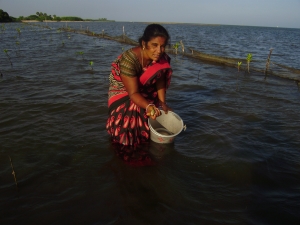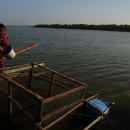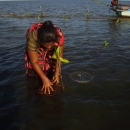Mangrove restoration project empowers Indian fisherfolk community
Location: Karankadu, India. 12th Jan 2016
30-year-old mother of two Jenitha and her husband are fisherfolk who practice traditional crab and fish catching along with 1500 other residents of Karankadu. The availability of fish is dependent on the growth of nearby mangroves that sustain nurseries of economically important species for the community. In recent times, their livelihoods have been threatened by the loss of mangroves due to diminishing fresh water flows as well as the growth of trawler fishing in the region.
“Our catch became smaller and smaller. Most of the fish were being caught by big fishing companies who use mechanized boats. Our manual boat simply could not compete with them,” explains Jenitha.
Without sufficient fish to catch and sell, Jenitha was not earning enough money. Along with many other women in the village, she was forced to find supplementary sources of income to support her family, something that she struggled with at the beginning.
“I did not know how to do anything else besides catching and selling fish. I also had no time and money to learn new things,” she said.
Through the ‘Participatory community engagement and education for conservation of mangroves in Palk bay areas of Ramanathapuram district in Tamil Nadu’ project, Jenitha, along with 40 other women, learnt new and vital livelihood skills including cage culture fishing and pickle making from fish.
Aside from the capacity building component, the project also successfully developed a model for the restoration of mangroves, improving the resilience of the village to natural disasters in the process.
“I learned that cultivating mangrove plants ensures healthy growth of fish populations, and that mangroves act as a natural shelter during natural disasters such as floods and tsunamis. These are things I never knew before,” added Jenitha.
Now, in addition to selling fish and crabs that she and her husband catch, Jenitha also sells pickles that she makes. In the evenings, she cultivates mangrove plants.
With the new skills that she acquired, Jenitha is bringing in income to repay her debts and renovate her house. The quality of life for her family is slowly improving and that she has become more self-confident.
“My inter-personal communication skills have improved. In the past, I was very shy and fearful of meeting government officers, and hesitant of entering banks and rural development offices. The project has helped me to overcome all these insecurities and be more confident of myself,” added Jenitha.
About the project
With support from MFF, the “Participatory community engagement and education for conservation of mangroves in Palk bay areas of Ramanathapuram district in Tamil Nadu” project was implemented in Karankadu, a coastal village in Ramanathapuram district, India, from December 2013 to June 2015. Implemented by local NGO Society for People Education and Economic Development (SPEED), the project developed a model for the restoration of mangroves so as to enhance the livelihoods of fisher folks; provided supplementary livelihood training sessions for fisher women; and improved the resilience of the village to natural disasters.
For more information, visit this page.


